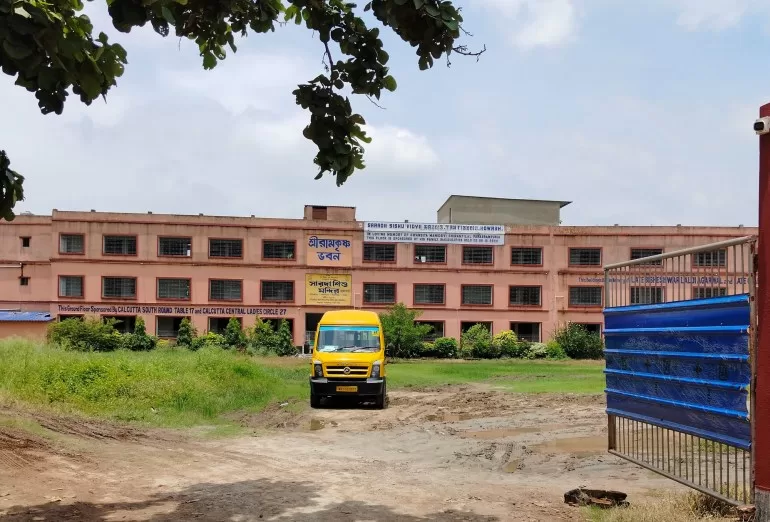The walls in the prayer hall are bedecked with colourful posters of Hindu deities, saints, mythological figures, ancient Indian scholars, kings and Hindu religious practices. The prayer starts with the Saraswati Vandana, a chant praising Saraswati, the Hindu goddess of knowledge.
The same routine is followed at Sarada Shishu Mandir, the preprimary school for children to grade four which stands next to it.
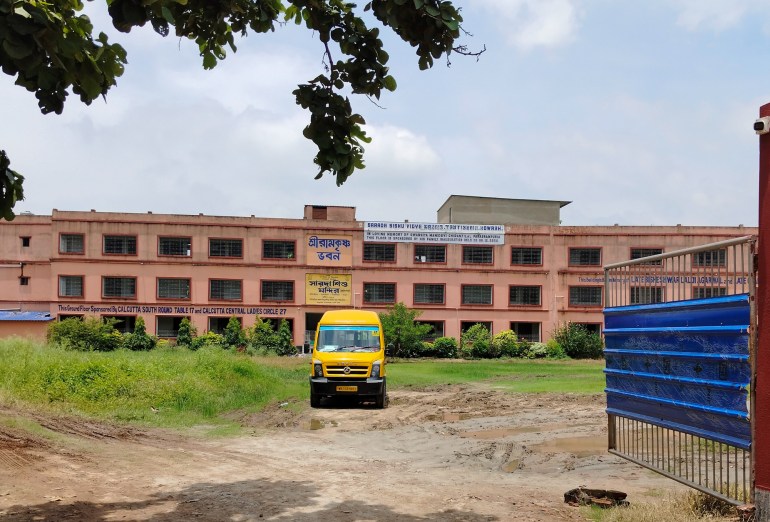
When students enter the classrooms after the prayers, they encounter the same ancient figures yet again – in a series of books called Sanskriti Bodhmala, or cultural awareness manuals, published in English, Hindi and several other Indian languages. The Sanskriti Bodhmala books are mandatory for the students of classes four to 12, who also have to take a nationally coordinated annual test based on these books.
For more than two centuries, millions of Indians, especially Hindus, have long read about the ideas and philosophies attributed to ancient scholars from what is known as the Vedic era (1500 BC to 500 BC), when many of the religion’s scriptures were written.
But under Prime Minister Narendra Modi, many of these concepts have made their way into India’s vast formal schooling system, blurring the lines between religious Hindu beliefs on the one hand and established history and science on the other.
In a country where half the population is younger than 25, this, say critics, has given Modi’s Bharatiya Janata Party (BJP) and their Hindu majoritarian partners the ability to use pedagogy to influence the minds of millions of young Indians – many of whom will be voting for the first time in national elections expected to be held between March and May.
Atoms to aviation
Vedic-era philosopher Kanada was the world’s first atomic scientist, say the books meant for the students of classes four and six.
Kanada, in his book Vaisheshika Darshan, did write about anu (atoms) being the smallest particles of substances that cannot be further divided. But the substances he listed – prithvi (earth), jala (water), tejas (fire), vayu (air), akasha (ether), kala (time), dik (space), atma (soul) and manas (mind) — make it clear, say scientists, that he was speaking in philosophical or metaphysical terms.
The class five textbook tells them that Vedic sage Bharadwaja, who is credited with writing the book Vymaanika Shastra (Science of Aeronautics), was the “father of aviation”. The class five and class 12 books call ancient Indian physician Sushruta “the inventor of plastic surgery”.
The Sanskriti Bodhmala books are not approved by the government. But they have been taught in addition to the state-approved syllabus for decades in a large chain of schools run by the Rashtriya Swayamsevak Sangh (RSS), the far-right ideological mentor of the BJP.
The schools are formally operated by Vidya Bharati, the education wing of the RSS, which controls more than 12,000 such schools catering to nearly 32 million students across India. The schools are affiliated with the Central Board of Secondary Education (CBSE) or the government education boards of the states they are located in.
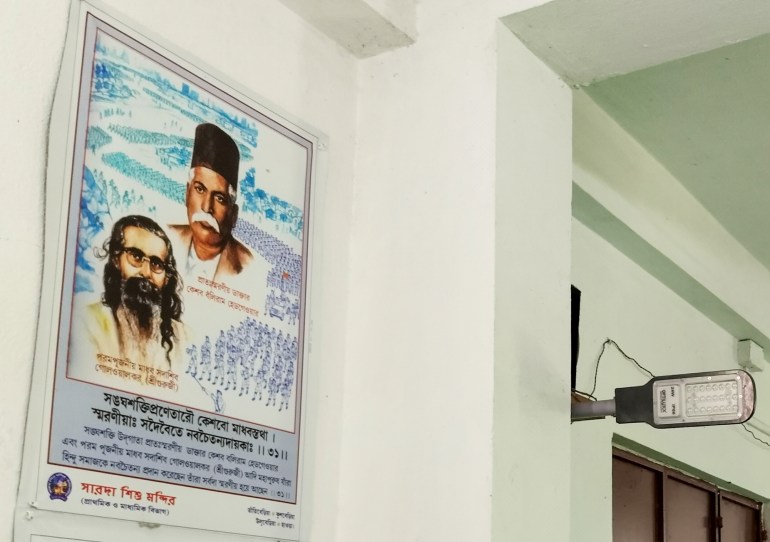
In recent years, unsubstantiated historical and scientific claims – being taught in Vidya Bharati schools – have made their way into the formal syllabus of state-run schools.
The claims of Kanada’s atomic theory and Sushruta’s plastic surgery are already a part of the curriculum of the National Institute of Open Schooling (NIOS) – an education board controlled by the federal government. The NIOS describes itself as “the largest open schooling system in the world with a cumulative enrolment of 4.13 million [during last five years]” students.
The NIOS curriculum also encourages students to find out about Vedic mathematics – another subject taught specifically at RSS schools.
The National Council of Educational Research and Training’s (NCERT) new module on India’s moon mission says the book Vymaanika Shaastra “seemingly reveals that our civilisation had the knowledge of flying vehicles”.
The NCERT is the apex body advising the federal and state governments on school education, including model textbooks. However, various state education boards may differ from NCERT’s advice and pursue their own syllabus. Among federal government boards, CBSE had 1.2 million students appearing in the grade 12 exams and 1.8 million students appearing in the grade 10 exams in 2020.
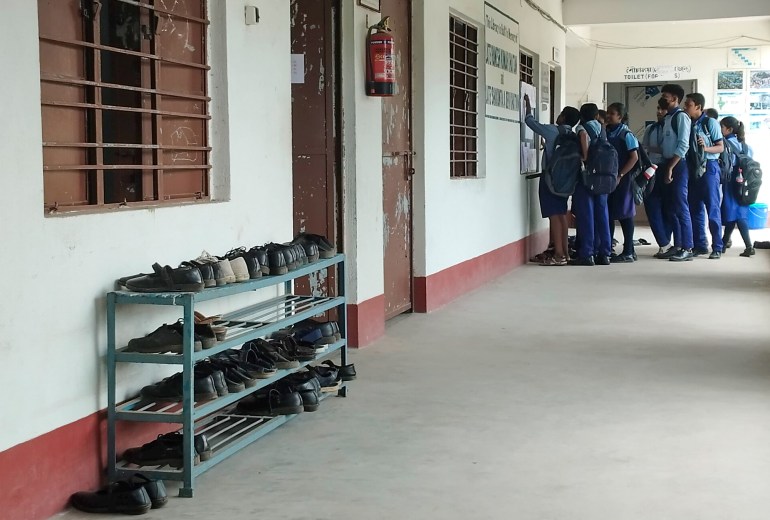
In 2019, federal Education Minister Ramesh Pokhriyal said, “Our scriptures mentioned the concept of gravity much before Newton discovered it.” Sanskriti Bodhmala books say the same, one of its books attributing it to fifth-century mathematician Aryabhatta and another to 12th-century mathematician Bhaskaracharya.
“The Sanskriti Bodhmala books have no conflict with the formal syllabus, as the history presented here is entirely missing in the existing formal syllabus, which thoroughly neglects India’s pre-Mughal history. That is where we stress on,” Proloy Adhikary, in charge of Uluberia’s Sarada Vidya Mandir, told Al Jazeera.
He said the National Education Policy (NEP) that the Modi government has introduced had been implemented in Vidya Bharati schools for several years now.
“The NEP has taken some of our schools’ practices to the broader sphere,” he said, hoping for more information from the Sanskriti Bodhmala books to find their way into the formal national school syllabus.
‘Glorious culture’
Vidya Bharati says its cultural awareness examination for students was introduced in their schools “with a view to transmitting a glorious culture to the new generation”.
Debangshu Kumar Pati, a Vidya Bharati official in West Bengal, claimed the contents of their books are well-researched. “We inform students of the history that the colonialist and Marxist historians have suppressed to make generations of Hindus feel inferior,” he told Al Jazeera.
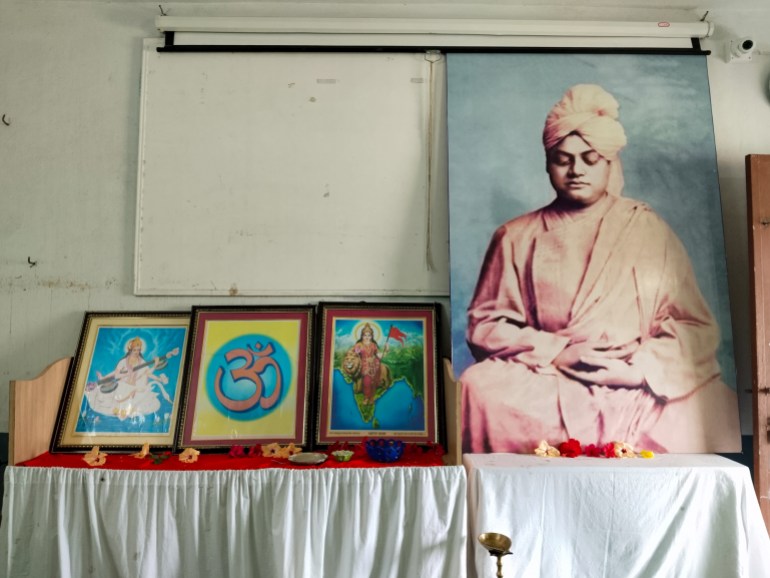
But historians – not just Marxists among them – as well as scientists and other critics have accused the Modi government of altering school syllabi to suit their Hindu nationalist agenda.
Hilal Ahmed, associate professor of history at New Delhi’s Centre for the Studies of Developing Societies (CSDS), told Al Jazeera no one can be blamed for telling new histories “as the discovery of the past always lies in the future – as long as proper historiographical methods are followed”.
“Since history writing is a complex process, serious historians have evolved methods and protocols, including the requirements to verify the veracity of the sources, introducing the sources, and explaining how the information is being interpreted and connections are being made. But these schools don’t follow the protocol of citing serious history,” he said.
Ahmed thinks the Sanskriti Bodhmala textbooks present history as if they have discovered “the final truth of the past”, calling them “anti-student”.
“They introduce a kind of pedagogy that would not allow the students to draw their own meanings of the past. The students would be hostile to other renditions of history. They are being prevented from thinking of the past afresh in the future,” he said.
Jayant Vishnu Narlikar, one of India’s best-known cosmologists, debunked many such claims in his 2003 book, The Scientific Edge: The Indian Scientist from Vedic to Modern Times. Most claims about modern scientific discoveries having a Vedic origin “do not stand up to scientific scrutiny”, Narlikar wrote, adding: “That they were curious about the universe is beyond doubt. But that they knew what modern science talks about today cannot be accepted.”
In 2023, when Indian Space Research Organisation (ISRO) chief S Somanath claimed that major scientific developments in branches like metallurgy, astrology, astronomy, aeronautical sciences, and physics took place in ancient India and were later taken to Europe by the Arabs, Breakthrough Science Society (BSS) issued a statement, asking, “If superior knowledge in astronomy, aeronautical engineering, etc., is available in the ancient texts in Sanskrit, why isn’t the ISRO using them?”
“Can he [Somanath] show one piece of technology or theory that ISRO has taken from the Vedas and applied to make a rocket or a satellite?” the statement asked. The BSS is a Kolkata-based group of rationalist scientists.
From fringe to mainstream
Vidya Bharati’s role in pushing a certain kind of history is part of a larger project of what critics have called the “saffronisation” of education, after the favoured colour of the Hindu right. It is a process pursued by the Modi government and the institutions controlled by it.
The Sanskriti Bodhmala books are published by Vidya Bharati Sanskriti Shiksha Sansthan, whose former president, Govind Prasad Sharma, served on the BJP government’s National Curriculum Framework’s steering committee formed in 2021.
Of the 25 focus groups the state-run NCERT formed to develop the National Curriculum Framework, based on which new textbooks for government schools were written, five had Vidya Bharati officials as members.
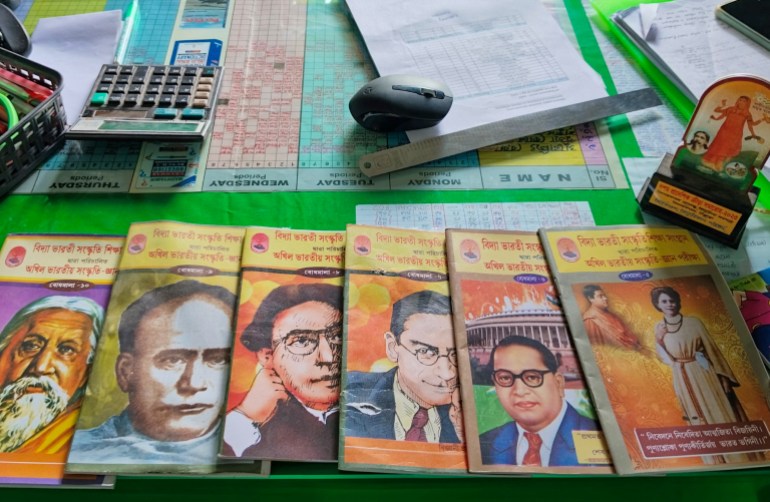
According to Vidya Bharati’s national president D Ramakrishna Rao, “senior and retired teachers” of their schools were being picked up as resource people in many Indian states for writing textbooks for government schools.
“Vidya Bharati has been putting its all-out efforts and providing unstinted support to the government at the [education] policy preparation stage for almost five years,” Rao wrote in a column for a right-wing website in 2021.
Some of their schools’ principals and office bearers are members of the committee for the development of the National Professional Standards for Teachers, and almost every state task force for the implementation of the NEP included their representatives who “actively monitor” the process, Rao added.
‘Catch the Hindu minds young’
Between 1999 and 2004, when the BJP formed its first-ever federal government, a similar effort to change school curriculum was made.
A key name to emerge for that project was Dinanath Batra, then Vidya Bharati’s general secretary. Shortly after Modi came to national power in 2014, his home state Gujarat made Batra’s books mandatory in government schools.
Batra is a pioneer among Hindu nationalist historians, even though globally acclaimed historians such as Romila Thapar and Irfan Habib accuse him of turning both history and geography into fantasy.
Journalist Nilanjan Mukhopadhyay, who has authored several books on Hindu nationalism, and has a biography of Modi, told Al Jazeera the Vidya Bharati schools are part of the RSS’s larger strategy of creating hegemony over all walks of life, including education.
Mukhopadhyay said the idea behind the RSS operating such a large network of schools across the country is to “catch the Hindu minds young and instil the idea of ancient Hindu invincibility, a past when Hindu India was the dominant race all over the world and that the golden bird of Indian civilisation was destroyed by thousands of years of slavery, first in the hands of Muslims and then the [Christian] colonial powers”.
He said Modi’s rule has given the Hindu nationalists “their best chance to restore that ancient glory of global Hindu superiority”.
“If you instil such thoughts in children’s minds, they will grow up with a tremendous amount of anger against Muslims and Christians. Such information attempts to create a constant state of paranoia in Hindu minds about the entire world being a conspirator against Hindu supremacy,” he said.
